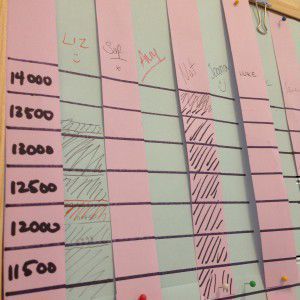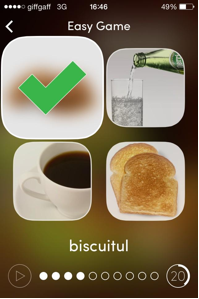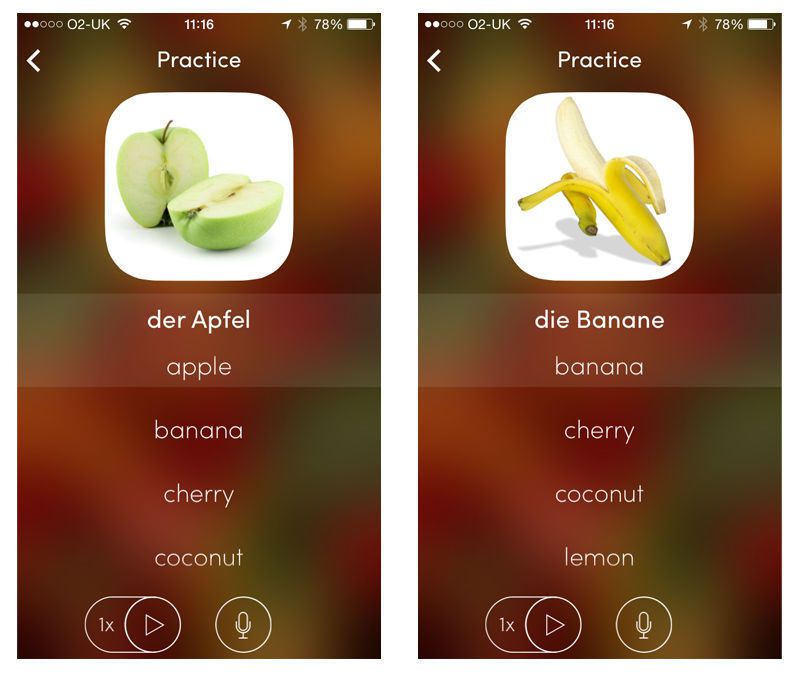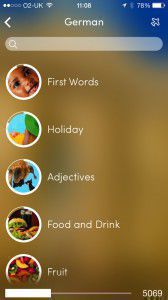The uTalk language challenge – how did you do?
The uTalk language challenge for January comes to an end on Saturday, and we’ve loved hearing about everyone’s progress! Check back here next week to see how we all got on here in the office (trust me, you won’t want to miss that), but in the meantime, we asked a few of our most enthusiastic competitors to tell us how they got on.
Has anyone else taken part in the uTalk challenge? Did you enjoy it, and most importantly will you be continuing with your new language? We’d love to hear from you, so please share in the comments 🙂 And if you missed it this month, it’s never too late to start – uTalk is available from the App Store, and you can start learning your first essential words completely free.
Don’t miss our February photo challenge, which kicks off on Sunday!
Now over to our uTalkers 🙂
Ingrid, learning Serbian
I’ve really enjoyed doing the challenge. Serbian is a language I’ve wanted to get to grips with for a long time for quite a bizarre reason (it involves a love of the Eurovision Song Contest!) but I haven’t really known where to start.
The app’s been great, although I’d recommend using it on an iPad rather than an iPhone if you can. Oh, and the range of languages available is amazing!
It’s been slow-going – well it’s a tricky language! – I tried to do some in my lunch-break and on my commute but it was generally too noisy to concentrate. I have a trip to Belgrade planned for early April and it would be so nice to communicate on even the most basic level in their own language, so I’ll definitely be keeping it up.
Patricia, learning Icelandic
My name’s Patricia and I’m from Montreal, Canada. I’m the happy owner of a wonderful Icelandic horse, Léttfeti. I’ve been riding Icelandic horses for four years and I’ve been to Iceland. And I absolutely love Björk 🙂 I took up the uTalk challenge so I could begin to learn more about the Icelandic Horse breed, about Icelandic riding and about Iceland in general. I hope to go back there soon.
The uTalk app is a whole lot of fun, filled with useful words and phrases. I particularly enjoyed repeating the words and phrases after the native speakers and then hearing my own voice. What a great tool to gain confidence and improve pronunciation! I also really liked the Iceland module, which contained many words and phrases pertaining to things that are specific to Iceland.
The app is very visually pleasing. It works offline, which is great for learning on planes, subways and other areas without internet. This app can also be used as an offline dictionary, which I find particularly useful. Thank you for this opportunity and I’m looking forward to the next Challenge!
@EuroTalk I’m getting the hang of it! The Icelandic pronunciation is so much fun! #NewYearNewuTalk pic.twitter.com/znHaX1hNy6
— Patricia Ochman (@speedbird_o) January 20, 2015
Alex, learning Romanian
I found it really fun learning some basic Romanian, especially because I’ve been able to greet Ioana each day saying ‘Buna Ziua’, and trying out a few random words on her. I found the speaking and recall games the most useful as you can check you actually know the words, rather than passively recognising them. The memory game, on the other hand, is the bane of my life as I always manage to forget where one thing is and miss the full score. Overall, I’ve found uTalk really fun and easy to use at the gym while I’m on the bikes or during my lunchbreak.
Jacqui, learning Croatian
I first discovered EuroTalk when my children were involved in the Junior Language Challenge in 2010, and, as a language graduate, was very impressed with how easy it was to master the basics. Since then, I have never quite prioritised the time to learn a new language myself, so when I heard about this month’s challenge for adults, it was just a matter of picking which one to try.
Why Croatian? It’s a country I quite fancy visiting, and as I’ve never attempted a Slavic language before, it seemed like a worthy contender for the challenge. Come 1st January, it soon became clear to me that Slavic languages do not have much immediately in common with either Romance or Germanic ones, and it often felt more like a string of tongue-twisters with some different accented letters to add into the mix for good measure. Daunting, yes, but I wasn’t going to let it beat me. I discovered that standing in the middle of the room and declaiming the words in theatrical fashion was quite effective!
After a month, I’ve made great progress. I haven’t earned maximum points (I’m on just over 4000), but I have managed to learn a lot more than I thought I would, even waking up some mornings with various phrases springing to mind! This achievement wouldn’t have been possible without something like the uTalk app. The approach of listening and repeating with a few simple games just works at this level of language acquisition.
The good news for me is that I’ve now booked a short break to Croatia in the summer – make mine a ‘čaša šampanjca, molim vas’.
Katherine, learning Czech
I chose to learn Czech as it was a completely new language to me, and I will be visiting there later in the year, so it will be fun to try out a few phrases!
I have found the app quite addictive – as soon as I’ve got a good score in one topic I want to get started on another one! The games really help you to learn quickly, and although I can’t pretend to remember every word, it will be easy to brush it up again later. So, a great challenge, and good fun!
7 ways to stay motivated in your language learning
So we’re now a few weeks into 2015, and chances are all the resolutions we made in a fit of great excitement on January 1st are a dim and distant memory. If one of your goals for this year is to learn a new language, here are a few tips to help you stick at it, even when real life gets in the way, and your motivation starts to fade…
Make it fun
You’re far more likely to learn if you’re enjoying yourself. Of course, the best way to pick up a language is to take a trip to the country where they speak it, but that’s not an option for most of us, particularly so soon after the expense of Christmas! So instead, get yourself an app like uTalk or pick up some Flashsticks to post up all over your house (and office, and car…). Or if you’re on a budget, make up your own game. There is no right way of learning a language, and everyone’s different – but wouldn’t you rather be having fun while you study than poring over a grammar book trying to memorise verb endings?
Make it a competition
I’m currently learning German, and know for a fact I wouldn’t be if it weren’t for the uTalk challenge. I don’t really need to learn German – I’m not going to Germany in the immediate future, nor do I have a German mother-in-law to impress – but I fancied trying something new and different. The problem with learning a language just for fun, though, is that it’s very easy to give up without a pressing reason to keep going. The uTalk challenge gave me that reason; I’m a very competitive person, and I wasn’t about to let my colleagues beat me (well, except Nat, who destroyed us all). Knowing that I had to come into work each morning and update my score on the board has kept me motivated, and as a result I now know probably several hundred new words that I didn’t know before.
Focus on the end goal
While there are many people who, like me, decide to learn a language just for the fun of it, there are many more who do it for a specific reason. So if you feel your enthusiasm starting to wane, focus not on learning the language, but on what it’ll mean when you’ve learnt it. Maybe it’s a new job, a new relationship or a forthcoming trip. If you concentrate on what you’re getting from knowing a new language, suddenly putting the time in to study won’t seem nearly such a chore.
Reward yourself regularly
Remembering your ultimate goal is important, but that can sometimes seem far, far away. If you were about to climb Everest and didn’t plan to stop till you got to the summit, you’d probably never start (and who could blame you). So make sure you set yourself achievable ‘in-between’ goals, and reward yourself appropriately when you get there. Personally, I find chocolate to be an excellent incentive. Or you could allow yourself an episode of your favourite TV show, or a shopping trip. Whatever works for you and will keep you motivated to press on.
Set aside time
Life can be incredibly busy, and often it feels like there isn’t enough time to do everything, so learning a language can slip down the to-do list behind other, more pressing tasks. To combat this argument, try setting aside a fixed amount of time each day, or a few times a week, which is only for language learning. Where that time fits into the rest of your schedule is up to you, but the important thing is that nothing else gets in the way. And if you can make use of ‘dead time’ like your daily commute, so much the better – that way you’re not using up hours that would ordinarily be used for other jobs.
Tell other people
I’m a great believer in this one. Tell friends and family that you’re learning a language, and chances are at some point, they’re going to ask you how it’s going. And if they don’t, ask them to. If I know that at any moment someone’s going to demand that I say something in another language, I’m much more likely to keep learning it, just in case. (Of course, when they do ask me to say something, my mind will instantly go blank – but that’s another story.)
Don’t give up, even if you slip up
As with any goal, there are going to be pitfalls along the way. You’d have to be incredibly determined (and slightly superhuman) to never have an off-day or consider giving up. And that’s ok, but the important thing is to pick yourself up after this wobble and keep going. Knowing you’ve overcome a few obstacles is only going to make the moment you have your first conversation in another language that much sweeter, because after all…
Good luck (or should I say Viel Glück)!
Liz
My uTalk Romanian journey so far
Having a look at the uTalk challenge scoreboard in the EuroTalk office, it looks like I’m some way behind with my Romanian learning. But I haven’t give up yet! Here’s what I’ve learned so far about this language.
1. It’s a lot like Italian
This is very helpful for me, as I already understand a reasonable amount of Italian (even if it’s only from watching too many episodes of Inspector Montalbano…), so words like ‘la rivedere’ (goodbye, like the Italian arrivederci), ‘buna seara’ (good evening, like buona sera in Italian) and many colours and adjectives are very similar (‘urata’, ugly, sounds like the Italian word brutta, and many others like ‘plin’/pieno, ‘trist’/triste, ‘rapid’/rapido, ‘negrul’/nero or ‘verdele’/verde). Numbers are also very close to those in Spanish or Italian.
2. Sometimes you can make words just by adding ‘ul’ to the end
Ioana helpfully informs me that this is just the masculine ‘the’ (the feminine is ‘le’), but it still seems like a reliable strategy to guess words. After words such as ‘trenul’, ‘aeroportul’, ‘pasaportul’, ‘doctorul’ and my personal favourite ‘biscuitul’, I started guessing other words like ‘vinul’ (correct!) and ‘mapul’ (sadly incorrect), which occasionally works.
3. The speaking game is really fun and addictive, and probably the best way to learn
I don’t know about other people, but for me, producing the language is the key to remembering it. So, speaking or writing the language is key. Repeating the phrases and then using my own recordings to identify the pictures is weirdly fun and helps me to remember better than simple guessing of pictures in the easy or hard games, which encourage recognition but not reproduction. Of course the ultimate test is the recall game, where you have to remember and say the word or phrase yourself and then check it. These games can take a while to get 100% on, but are an excellent tool.
4. You have to learn to make some brand new sounds
Romanian has a few fun letters that we don’t have. ‘â’ (with a little hat) sounds like an ‘uh’, not an ‘a’ at all. So ‘Cât e ceasul?’ (what’s the time) isn’t pronounced how it looks to English speakers, but like ‘Cuht e chassul’, because the â is a different letter, and ce is a ‘ch’ sound like in Italian. It also has a funny ‘I’ which looks like this: î and sounds like another ‘uh’, which is difficult to describe. This sound is in words like ‘închis’ (closed) which sounds more like ‘unkees’. These sounds are pretty fun to pronounce if you ask me, and Ioana says I sound ok, which I put down to repeating after the native speakers in uTalk.
5. They invented crazy words for vegetables that make no sense!
Ok, maybe that’s a bit harsh, but my knowledge of French, Spanish, Italian, English and German can’t help me when it comes to learning the names of vegetables that have names like ‘bamele’, ‘ardeiul’, ‘porombul’ and ‘varza’, which don’t relate to any language I know. They can’t even call zucchini zucchini: it’s actually ‘dovleceii’.
Somehow I don’t think I’m going to beat Nat in the uTalk challenge, but I’m having fun with Romanian anyway!
Alex
(Editor’s note: it turns out nobody could beat Nat, who completed the challenge in Icelandic a couple of days ago. She’s now considering which language to learn next – any suggestions?)
Learning lots of Icelandic!
Góðan dag!
As you may remember, I’ve been learning Icelandic for the January uTalk Challenge. It’s a totally new language for me, with different rules and pronunciation to other languages I’ve studied, and I’ve absolutely fallen in love with it.
There are a few sounds in Icelandic which I really love. One of them, which I’m going to (unflatteringly) call the ‘spitty’ sound, is the sound made by a double ‘L’, as in the word for car (‘bíll’). It’s incredibly satisfying to replicate, although I can’t really explain why – just find an Icelandic person and ask them to say the word for car, or get uTalk and hear our lovely voice artists say it, and you’ll see what I mean.
There are also a few sounds which have just tied my tongue into knots. Although a surprising amount of Icelandic seems vaguely intuitive for an English native speaker, occasionally I’ll come across a preposterously long word boasting a collection of ‘eð’s and ‘þorn’s (the two ‘th’ letters), and it’s really been a case of memorising the words at this stage. It took me absolutely ages to master ‘hjúkrunarfræðingur’ (rather less manageable than English’s nice and simple ‘nurse’) and ‘afgreiðslumaður’ (‘shop assistant’). However, on most topics there have been several items I can make an intelligent guess at, either because they have some connection to the English (‘hjarta’- heart, ‘kókoshneta’- coconut, ‘baunir’- peas, ‘bjór’- beer) or because Icelandic is wonderfully logical at times: it doesn’t take too much imagination to see that ‘á bak við tréð’ indicates ‘behind the tree’, and ‘Ég er með tannpínu’ means ‘ I have (lit. I am with) toothache’. So I have had it slightly easier than some of my colleagues, who have been battling with languages completely unconnected to English.
My technique has been to cram as much in as quickly as possible, launching into the Hard Game first and then going back to Practice to check on what I got wrong. I’ve left all the Recall sections until I’ve completed the other games in all the sections, and then I’ve gone back and used it as a test of how much I remember. I’ve also been pointing to people and things all weekend and saying the word in Icelandic, and getting anyone I’m with to repeat the words back to me. I’ve found this really useful because it makes you assume a certain amount of teacher-like responsibility, so if I’m not 100% sure on what I’ve told them I’ll go back and double-check it. Also, if they repeat back anything nonsensical I realise I’ve probably pronounced it terribly in the first place, and need to revise it. So thank you to everyone who’s put up with me spouting random Icelandic words at them recently! What I now plan to do is to leave the Icelandic for a week and then to come back to it towards the end of January and do all the Recall sections again, and see how much I remember (hopefully a lot).
I’ll leave you with my favourite word so far, which is ‘surfing’ – again, just another really satisfying sound: ‘brimbrettabrun’:
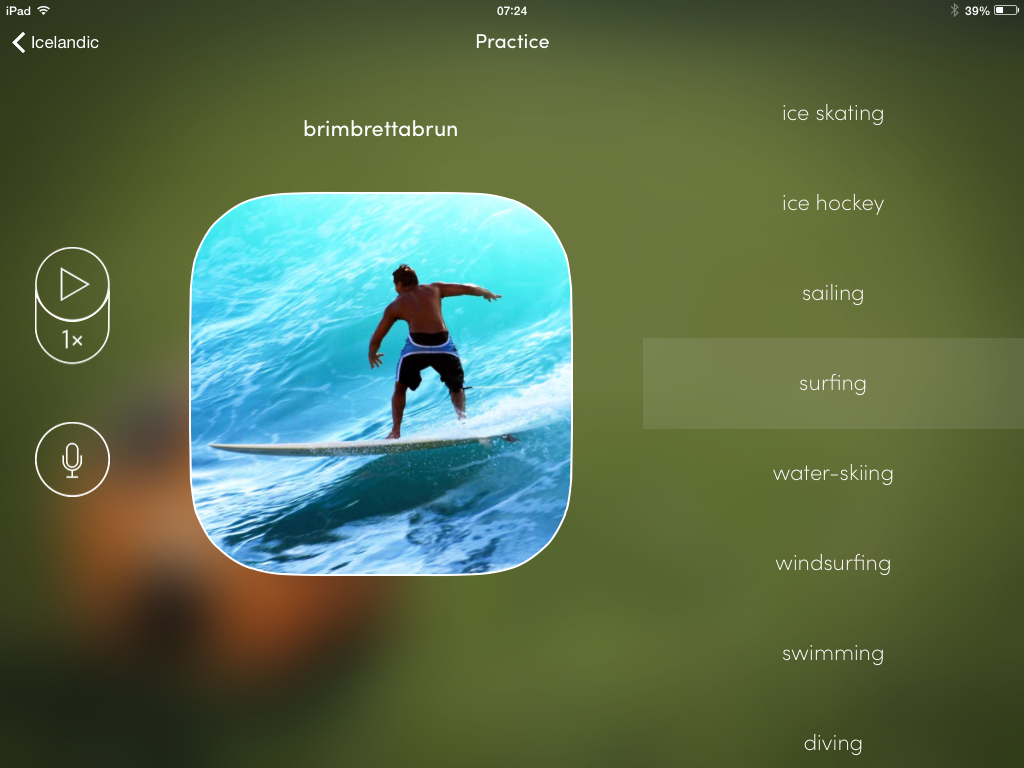 Is anyone else doing the uTalk challenge? How are you getting on?
Is anyone else doing the uTalk challenge? How are you getting on?
Nat
Learning German: a whole new world
So as you may remember, I recently decided to try and learn some German as part of the uTalk language challenge. It’s not a language I’ve ever studied before, and as much as I’m enjoying getting stuck in, it’s also proving quite a bit trickier than I expected.
First, the accent is quite difficult to master. Up to now, my language studies have focused on the Romance languages, particularly Spanish, with its soft, rolling ‘r’ sound and lovely, lilting quality. German is, in contrast, full of hard ‘d’s and ‘ch’s and is a very throaty language, whereas Spanish trips easily off the tongue. There’s a video that surfaces from time to time on the internet, about how everything sounds angry when you say it in German. I don’t necessarily agree with that, but it’s certainly a very different accent to the languages I’ve studied before and is taking a bit of getting used to. I’m pretty sure I’ve been speaking German with a Spanish accent some of the time, which is confusing to say the least.
Then there are the long words. This is actually one of my favourite things about German – the way you can express almost anything simply by sticking words together – but it’s also quite daunting for a learner. Nowhere is this more evident that in the numbers, which look slightly terrifying on first encounter. That said, the way they’re constructed is actually very logical (67, for instance, is ‘seven and sixty’), so they’re not quite as scary as they look. So far, this is my particular favourite – it looks like a tongue twister but still makes complete sense when you break it down into five and fifty:
Telling the time, on the other hand, is proving a bit of a killer. The main reason for this is that German approaches telling the time differently to English. So whereas here in the UK we say ‘half four’ to mean ‘half past four’, in Germany it means ‘half of the fourth hour‘ – or ‘half past three‘. And it gets better – if you want to say ‘twenty five past three’, it translates in German as ‘five to half four’. I’m sure this is perfectly logical to a German speaker, and I know other languages take the same approach, but it’s taking me a little while to adapt to it.
The other problem I’m having is learning the definite articles with nouns – how do you know when to use ‘der’, ‘die’ or ‘das’? Unlike Spanish, which has rules to help you at least take an educated guess at the article, German feels pretty arbitrary – and it doesn’t help that whereas most languages just have masculine and feminine nouns, German throws in a third one (neuter), just for fun. At the moment I’m just going with what ‘feels right’, with varying levels of success, so I think what I’ll need to do is learn every noun with its article, since there’s no other way of figuring it out. That shouldn’t take long…
I’m jumping in headfirst to the challenge, starting straight away with the games in uTalk to see how much I can work out on my own. Then I’m going back and running through the Practice section for each category to make sure I’ve understood everything correctly, and put meanings to words I may not be sure of. (I suppose it’s the equivalent of attempting a conversation with someone and then going away and looking up anything I didn’t understand in a dictionary.) The results are sometimes a bit messy, but I feel like I’m learning faster that way. I’m working through the categories one at a time, in order, but going back regularly to practise earlier ones and make sure I haven’t forgotten everything I’ve learnt. And I’m saving the Recall sections for later – that will be my final challenge and the ultimate test of how much I can remember!
Since I have a long journey to and from work, I’m making use of my time on the train to learn, and so far it’s not going too badly…
Who else is taking the uTalk challenge? How’s it going? Everyone learns differently, so we’d love to hear how you’re approaching the challenge.
And if you’d like to take part in the challenge, it’s not too late – just drop us an email to get involved!
Liz
